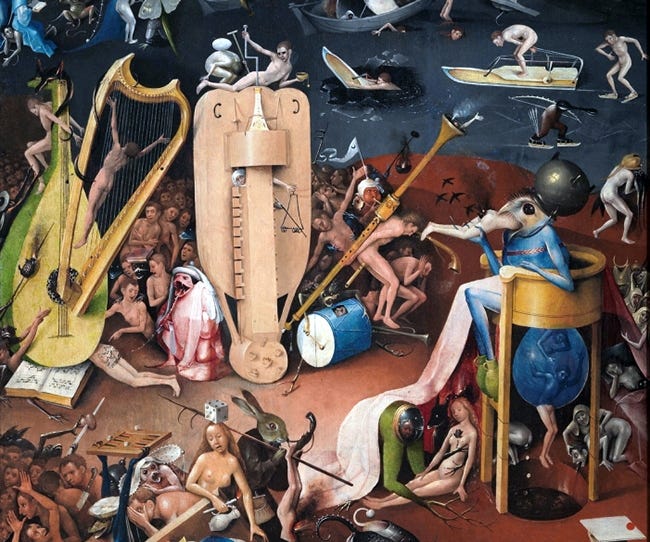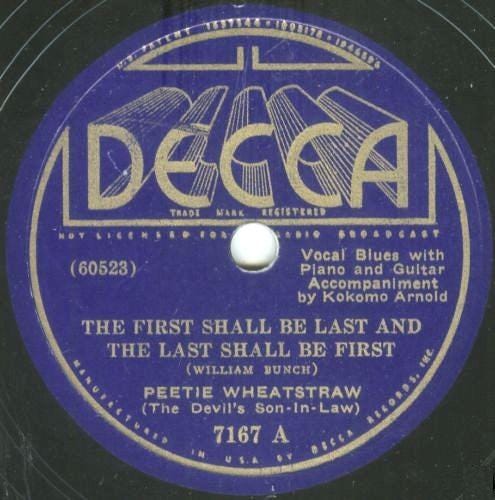Music in Hell
A Reddit thread on songs in Hell got more than 6,000 responses, but I have my own notions about Lucifer's playlist
Yes, there’s music in Hell, but don’t expect angels with harps. Below you can see how it was depicted in the 14th century.
What horn is that demon playing? My best guess is the vuvuzela. I’m told that extremely loud instrument didn’t exist before the 1960s, but to my ears this is the obvious soundtrack to afterlife in the never-ending Inferno.
But the most famous visual depiction of hellish music comes from Hieronymus Bosch, who provides a memorable image in the right panel of his triptych The Garden of Earthly Delights, now located in the Prado.
If you look closely, you will see the specific piece of music played there, and it’s actually notated.
Some intrepid musician has tried to perform the score tattooed on the posterior of one damned soul. But the resulting recording is far too gentle and peaceful to my ears—certainly not the “butt music” intended by Bosch, who may have been expressing his scorn for the traveling minstrels of his day.
Can music in hell actually sound this relaxing? Franz Kafka seemed to suggest as much in his letter to his likely lover Milena Jesenská: “None sing as purely as those in deepest hell; it is their singing we take for the singing of angels.” Perhaps he was speaking metaphorically of his own dark, devilish writings, but the tradition of beautiful music in the Underworld is an old one, dating at least as far back as the Orpheus myth.
Of course, not everyone agrees that Hell has a soundtrack. A friend assures me that the only sounds the damned hear in the next life will be “weeping and gnashing of teeth”—a phrase that occurs seven different times in the New Testament. Similar expressions appear in the Old Testament, although with less obvious reference to an afterlife—for example in Lamentations (where it refers to the Babylonian oppressors) and the Book of Job (where it’s God whose teeth are gnashing!).
The Honest Broker is a reader-supported guide to music, books, and culture. Both free and paid subscriptions are available. If you want to support my work, the best way is by taking out a paid subscription.
Does “wailing and gnashing of teeth” even count as music? Can we describe it as “vocals with percussion accompaniment”? Or does it represent the eternal noise that actually defines Hell’s soundscape? I note with interest that poet John Milton gave the name Pandemonium to the capital of Hell in his masterwork Paradise Lost—and that’s a word now associated with a high level of noise and chaos.
That makes perfect sense to me. You get music in Heaven and the noise of pandemonium in Hell. But who gets to decide which is which? That’s a job for an expert. So I cherish the notion that there might be demand for music critics in the next life.
Theologians have offered various opinions on these thorny matters. On one extreme we encounter the view, attributed to Saint John Chrysostom, that “where dance is, there is the Devil”—which at least holds open the possibility of ballrooms in Hell. At the other end of the spectrum, we find Brigham Young’s assertion that “there is no music in Hell, for all good music goes to Heaven.”
That’s a peculiar statement, because it forces us to ask where the bad music goes? Many people seem to think it ends up in Hell—consider this Reddit thread which discusses the songs that get played there, and has generated more than 6,000 responses. There were the usual expected votes for “We Built This City,” Céline Dion singing that awful love song from Titanic, the Barney theme song, or anything by Nickleback. But I was surprised by how many people thought the playlist in Hell would feature Tom Jones singing “What’s New Pussycat.”
By the way, here’s my preferred version of that song.
In the 20th century, many popular styles of music got condemned by religious authorities as the Devil’s music. Most people nowadays probably associate the term with rock or metal music, but similar attacks on the blues back in the 1920s were even more severe. And several classical musicians from even earlier eras were said to have made a “deal with the Devil” in order to attain their virtuosic skills. These accusations were made against Giuseppe Tartini (1692-1770), Niccolo Paganini (1782-1840), and Franz Liszt (1811-1886), among others.
In almost every instance, the musicians enjoyed greater popularity after their songs got linked to Satan. In some cases, they actually used the accusations as part of their marketing campaigns. Blues musician Peetie Wheatstraw apparently had no objections to getting called the “Devil’s Son-in-Law” or the “High Sheriff of Hell.” His record company even put the former title on the label to this release.
Even more bizarre, the tritone got labeled as the Devil’s interval. How in Hades did Lucifer get ownership of that useful intellectual property? If music in Heaven lacks tritones, it must be pretty tame stuff.
I note that not long after John Lennon faced widespread criticism for saying that the Beatles were more popular than Jesus Christ, a strange interlude with moving parallel tritones got inserted into a Beatles track. Coincidence or deliberate rebuttal? Make up your own mind.
And what about Robert Johnson, the most famous of all the musicians who made alleged deals with the Devil? I was originally uncertain how to deal with this well-known legend, so I decided to get some perspective from Mack McCormick (1930-2015), who had done extensive research on Johnson back in the 1960s and 1970s, even tracking down numerous people who had known the legendary guitarist. Unfortunately for all of us, McCormick never published his research, but here’s what he told me back in 2005—and I tend to agree now with everything he said about this matter:
“My gut feeling is that Johnson spread the story himself,” McCormick told me. “It’s a good story. It catches people’s attention. To some degree, Johnson created his own legend – not just this one, but several other legends too.
“When I went to New Orleans in the late 1940s to visit some record collectors,” McCormick continued, “they told me that same story [about Johnson’s deal with the Devil]. You need to remember that almost nothing had been published on Robert Johnson at that time. A little bit had been written around the time of the Spirituals to Swing Concert, and a couple of record reviews had appeared, but they were full of mistakes. Yet these record collectors had heard about Robert Johnson selling his soul to the Devil. I subsequently heard the same story within the black community. The fact that the same story circulated among these two groups—groups that had very little contact with each other—impressed me. It suggests that the story had deep roots, probably linking back to Johnson himself.”
I know from my research into other early blues musicians that many felt their music was inherently sinful. Some of them even gave up playing the blues because of religious scruples. Son House wanted to be a preacher, and would put down the guitar when he sang “John the Revelator” in concert—perhaps because, as he once admitted, he feared that even touching the guitar might be sinful. Or consider the case of Ishmon Bracey, who recorded some earthy blues in the 1920s, but when my friend Gayle Dean Wardlow tracked him down in 1963, the former musician was now a minister, and would only agree to a comeback recording session if he could sing religious songs instead. Blues singer Robert Wilkins also became a reverend, and although he agreed to sing the old songs, he cleaned up the lyrics. Other important figures in American music (Blind Willie Johnson, Reverend Gary Davis) have showcased the vocal and guitar techniques of blues music, but adapted for use in more devout songs of Christian life.
So these considerations lead me to conclude that our best hope for music in Hell is neither wailing nor gnashing of teeth nor even demons playing the vuvuzela, but perhaps just some kind of blues. And that might even have a solid theological ground. After all, if the blues is a lament for a love gone bad, what better song for a lost soul to sing?
And if, as a few religious authorities suggest, Heaven is the ultimate destination of all human souls, then we might have those very same blues songs on the playlist—just so long as a few words get changed here and there. After all, “why should the Devil,” as Methodist preacher Rowland Hill (1744–1833) once asked, “get all the best tunes?”







I have terrible memories of the vuvuzela at the 2010 World Cup FIFA soccer matches in Such Africa. At one point I think they were banned from further use.
Why does “We Built This City” get so much hate? I wouldn't call it good, just so-so. But there's plenty of other pop hits that are much worse.